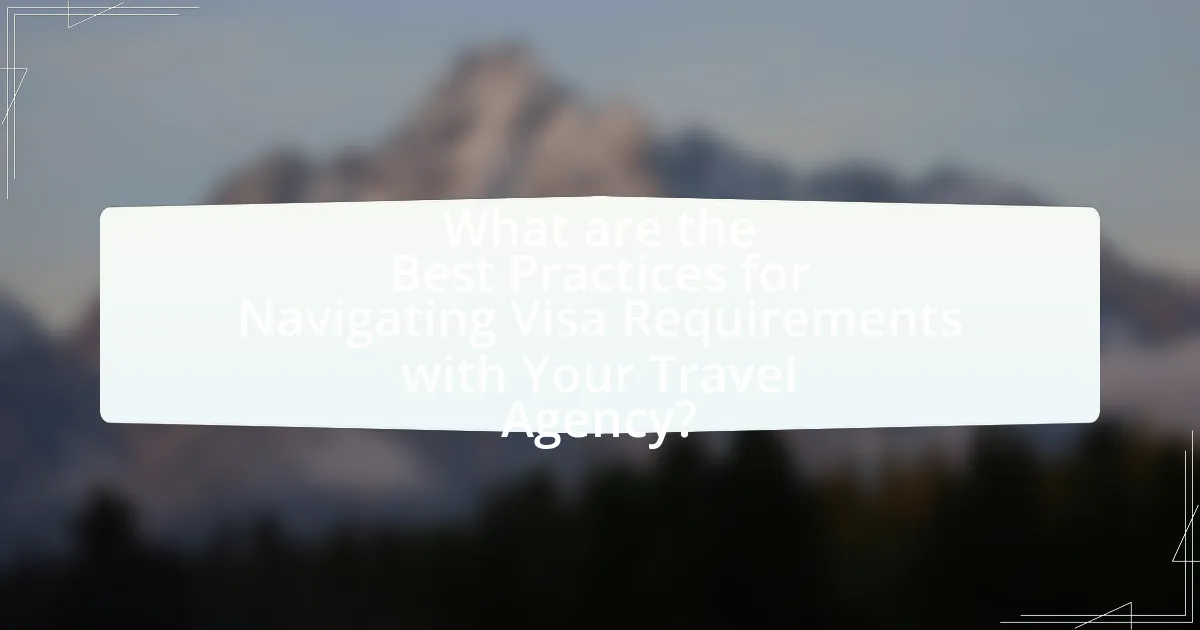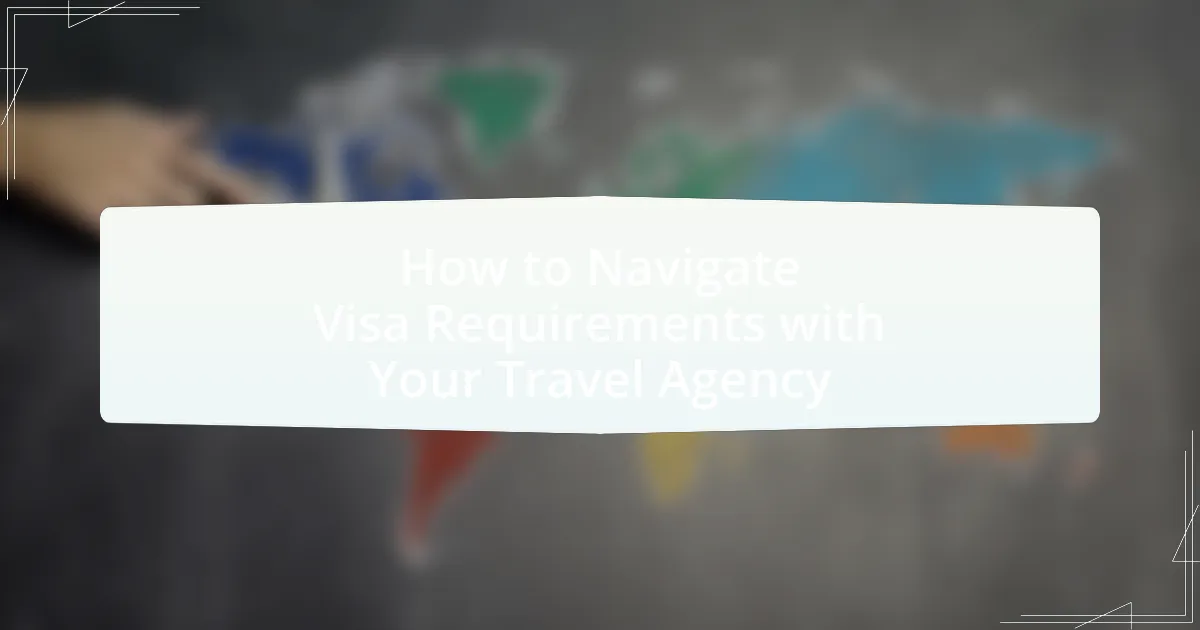Visa requirements are essential regulations that travelers must adhere to in order to enter foreign countries legally, impacting eligibility for entry and national security. This article explores the variability of visa requirements based on nationality, diplomatic relations, and geopolitical factors, highlighting how these elements influence the ease or difficulty of travel. It also examines the critical role travel agencies play in assisting travelers with visa applications, including guidance on documentation and navigating complex processes. Additionally, common challenges faced by travelers and best practices for effectively working with travel agencies are discussed, providing insights into how to streamline the visa application process and ensure compliance with requirements.

What are Visa Requirements and Why are They Important for Travelers?
Visa requirements are the specific regulations and documentation that travelers must fulfill to enter a foreign country legally. These requirements are crucial for travelers because they determine eligibility for entry, help prevent illegal immigration, and ensure national security. For instance, many countries require a valid passport, a visa application, and sometimes proof of sufficient funds or a return ticket. Failure to meet these requirements can result in denied entry, fines, or deportation, highlighting their importance in international travel.
How do visa requirements vary by country?
Visa requirements vary significantly by country, influenced by factors such as diplomatic relations, security concerns, and economic agreements. For instance, citizens of the United States can travel to over 180 countries without a visa or can obtain a visa on arrival, while citizens of countries with less favorable diplomatic relations may face stricter requirements, such as needing to apply for a visa in advance. Additionally, regional agreements, like those within the European Union, allow for free movement among member states, further illustrating the variability in visa requirements based on nationality and geopolitical context.
What factors influence visa requirements for different nationalities?
Visa requirements for different nationalities are influenced by factors such as diplomatic relations, security concerns, economic conditions, and historical context. Diplomatic relations between countries can lead to visa exemptions or simplified processes for certain nationalities, as seen in agreements like the Schengen Area, which allows free movement among member states. Security concerns often dictate stricter visa requirements for countries perceived as high-risk, based on factors like terrorism or political instability. Economic conditions, including the potential for illegal immigration or economic migration, also play a role; countries may impose stricter requirements on nationals from economically disadvantaged regions. Historical context, such as past conflicts or colonial ties, can further shape visa policies, as seen in the differing requirements for former colonies compared to their colonizers.
How do political relations affect visa policies?
Political relations significantly influence visa policies by determining the ease or difficulty of travel between countries. When nations maintain strong diplomatic ties, they often establish reciprocal visa agreements that facilitate travel, such as visa waivers or simplified application processes. For instance, the Schengen Agreement allows for free movement among European countries due to their cooperative political relations. Conversely, strained relations can lead to stricter visa requirements, as seen in cases where countries impose travel bans or lengthy application processes in response to political tensions. Historical examples include the U.S. visa restrictions on certain countries following geopolitical conflicts, which illustrate how political dynamics directly shape visa regulations.
What role does a travel agency play in navigating visa requirements?
A travel agency plays a crucial role in navigating visa requirements by providing expert guidance and assistance throughout the visa application process. Travel agencies are knowledgeable about the specific visa requirements for various countries, including necessary documentation, application forms, and deadlines. They often have established relationships with consulates and embassies, which can facilitate smoother communication and expedite the processing of visa applications. Additionally, travel agencies can help travelers avoid common pitfalls, such as incomplete applications or incorrect information, which can lead to delays or rejections. Their expertise ensures that travelers are well-informed and prepared, increasing the likelihood of a successful visa application.
How can travel agencies simplify the visa application process?
Travel agencies can simplify the visa application process by providing comprehensive support services, including document preparation, application submission, and expert guidance on visa requirements. By leveraging their expertise, travel agencies can ensure that clients have all necessary documents, such as passports, photographs, and financial statements, organized and ready for submission. Additionally, travel agencies often have established relationships with consulates and embassies, which can expedite processing times and reduce the likelihood of application errors. According to a study by the International Air Transport Association, 70% of travelers reported that using a travel agency made the visa process easier, highlighting the effectiveness of these services in streamlining the application experience.
What services do travel agencies offer regarding visa assistance?
Travel agencies offer a range of services regarding visa assistance, including visa application guidance, document preparation, and submission on behalf of clients. They help travelers understand the specific visa requirements for their destination, ensuring that all necessary paperwork is completed accurately and submitted in a timely manner. Additionally, travel agencies often provide updates on visa processing times and can assist with any follow-up inquiries with consulates or embassies. This support streamlines the visa acquisition process, reducing the likelihood of delays or rejections.
What common challenges do travelers face with visa requirements?
Travelers commonly face challenges such as complex application processes, varying documentation requirements, and strict deadlines when dealing with visa requirements. The complexity of application processes often leads to confusion, as different countries have unique forms and procedures. Additionally, documentation requirements can vary significantly; for instance, some countries may require proof of accommodation, while others may ask for financial statements. Strict deadlines can also pose a challenge, as travelers must submit applications well in advance of their travel dates to avoid delays or rejections. These factors contribute to the overall difficulty in obtaining visas, making it essential for travelers to thoroughly research and prepare for their specific visa needs.
How can travelers avoid common pitfalls in the visa application process?
Travelers can avoid common pitfalls in the visa application process by thoroughly researching the specific visa requirements for their destination country. This includes understanding the necessary documentation, application forms, and deadlines, as each country has unique regulations. For example, the U.S. requires a completed DS-160 form for non-immigrant visas, while Schengen countries require a visa application form specific to the country of entry. Additionally, travelers should ensure that their passport is valid for at least six months beyond their intended stay, as many countries enforce this rule strictly. By double-checking all requirements and submitting applications well in advance, travelers can significantly reduce the risk of delays or rejections.
What are the consequences of not meeting visa requirements?
Not meeting visa requirements can result in denial of entry into the destination country. This consequence can lead to immediate deportation, fines, or bans on future travel to that country. For instance, countries like the United States enforce strict visa regulations, and failure to comply can result in a ten-year ban for certain violations. Additionally, travelers may incur financial losses from non-refundable travel expenses and may face difficulties in obtaining visas for other countries in the future due to a negative immigration record.

How to Effectively Work with Your Travel Agency on Visa Requirements?
To effectively work with your travel agency on visa requirements, clearly communicate your travel plans and specific visa needs. Providing detailed information about your destination, travel dates, and purpose of travel enables the agency to offer accurate guidance. Travel agencies often have access to up-to-date visa regulations and can assist in gathering necessary documents, such as passport copies and invitation letters. According to the International Air Transport Association, 80% of travelers rely on travel agencies for visa assistance, highlighting their expertise in navigating complex visa processes.
What information should you provide to your travel agency for visa processing?
To process a visa, you should provide your travel agency with your personal identification details, including your full name, date of birth, nationality, and passport information. Additionally, you need to supply travel details such as your intended travel dates, destination, and purpose of travel. Supporting documents like a recent passport-sized photograph, proof of accommodation, travel itinerary, and financial statements may also be required. This information is essential as it helps the travel agency to accurately complete the visa application and ensure compliance with the specific requirements of the destination country.
How does your personal travel history impact visa applications?
Your personal travel history significantly impacts visa applications by influencing the perception of your reliability and intent to return. A strong travel history, characterized by previous successful international trips, demonstrates compliance with visa regulations and a pattern of returning to your home country, which can enhance your credibility in the eyes of visa officers. Conversely, a lack of travel history or previous overstays can raise red flags, leading to increased scrutiny or denial of your application. Statistics show that applicants with a documented history of travel to countries with strict visa policies are often viewed more favorably, as they are perceived as less likely to overstay their visas.
What documentation is typically required for visa applications?
Visa applications typically require a valid passport, completed application form, passport-sized photographs, proof of travel itinerary, financial statements, and any additional documents specific to the visa type. A valid passport serves as the primary identification document, while the application form provides essential personal information. Passport-sized photographs are needed for identification purposes. Proof of travel itinerary, such as flight bookings and accommodation details, demonstrates the purpose of travel. Financial statements, like bank statements, confirm the applicant’s ability to support themselves during their stay. Additional documents may include invitation letters, employment letters, or proof of enrollment in educational institutions, depending on the visa category.
How can you ensure your travel agency is reputable and knowledgeable about visa requirements?
To ensure your travel agency is reputable and knowledgeable about visa requirements, verify their credentials and experience in handling visa processes. Look for agencies that are members of recognized industry associations, such as the International Air Transport Association (IATA) or the American Society of Travel Advisors (ASTA), which require adherence to professional standards. Additionally, check online reviews and testimonials from previous clients to assess their reliability and expertise. Agencies that provide clear, up-to-date information about visa requirements for various destinations demonstrate their knowledge and commitment to customer service.
What questions should you ask your travel agency regarding their visa services?
You should ask your travel agency the following questions regarding their visa services: “What types of visas do you assist with?” This question clarifies the range of visa options available, such as tourist, business, or student visas. Additionally, inquire, “What is the processing time for each type of visa?” Understanding the timeline helps in planning your travel schedule effectively.
Another important question is, “What documents are required for the visa application?” This ensures you gather all necessary paperwork in advance. You should also ask, “Do you provide assistance with filling out the visa application forms?” This determines if the agency offers support in completing complex forms.
Furthermore, inquire, “What are your fees for visa services?” Knowing the costs upfront helps in budgeting for your trip. Lastly, ask, “Can you provide updates on the visa status during processing?” This question ensures you stay informed about your application progress.
How can you verify the credentials of a travel agency?
To verify the credentials of a travel agency, check for their registration with relevant government authorities, such as the International Air Transport Association (IATA) or the American Society of Travel Advisors (ASTA). These organizations require agencies to meet specific standards, ensuring legitimacy and professionalism. Additionally, review customer testimonials and ratings on platforms like Trustpilot or Google Reviews, which provide insights into the agency’s reliability and service quality.

What are the Best Practices for Navigating Visa Requirements with Your Travel Agency?
The best practices for navigating visa requirements with your travel agency include thorough research, clear communication, and utilizing expert resources. Travel agencies should stay updated on visa regulations for various destinations, as these can change frequently. Clear communication with clients about required documents, timelines, and potential challenges is essential to avoid delays. Additionally, leveraging resources such as government websites and visa service providers can enhance accuracy and efficiency in the visa application process. These practices ensure that travelers are well-informed and prepared, reducing the risk of complications during their journey.
How can you stay informed about changes in visa regulations?
To stay informed about changes in visa regulations, regularly check official government websites and subscribe to updates from relevant embassies or consulates. These sources provide the most accurate and timely information regarding visa policies, including any changes or new requirements. For instance, the U.S. Department of State and the UK Home Office frequently update their visa information, ensuring travelers have access to the latest regulations. Additionally, following reputable travel advisory services and legal immigration blogs can offer insights and analyses on visa changes, further enhancing your understanding of the evolving landscape.
What resources can help you track visa requirement updates?
Government websites, such as the U.S. Department of State and the UK Home Office, provide official and up-to-date information on visa requirements. These resources are reliable as they are maintained by the respective governments and reflect the latest changes in visa policies. Additionally, travel advisory services like the International Air Transport Association (IATA) and visa service providers such as VisaHQ offer tools and updates on visa requirements for various countries, ensuring travelers have access to accurate information.
How can you communicate effectively with your travel agency about visa concerns?
To communicate effectively with your travel agency about visa concerns, clearly outline your specific visa requirements and deadlines. Providing detailed information, such as the destination country, type of visa needed, and travel dates, enables the agency to assist you accurately. Additionally, ask direct questions regarding the visa application process, required documents, and any potential issues that may arise. This approach ensures that both you and the travel agency are aligned on expectations and can address any concerns promptly.
What tips can help streamline the visa application process with your travel agency?
To streamline the visa application process with your travel agency, ensure you provide all required documentation upfront. This includes your passport, photographs, and any supporting documents specific to your visa type. By submitting complete and accurate information, you reduce the chances of delays caused by missing paperwork. According to the U.S. Department of State, incomplete applications are a common reason for processing delays, emphasizing the importance of thorough preparation. Additionally, maintaining clear communication with your travel agency about timelines and requirements can further expedite the process, as agencies can better assist you when they have all necessary details.
How can early planning impact your visa application success?
Early planning significantly enhances the success of your visa application by allowing ample time to gather necessary documents and meet specific requirements. When applicants start the process early, they can thoroughly research visa regulations, ensuring compliance with all criteria set by the destination country. This proactive approach reduces the likelihood of errors or omissions that could lead to delays or rejections. For instance, the U.S. Department of State advises that applicants should apply for visas at least three months before their intended travel date to accommodate processing times and potential additional requests for information. Thus, early planning not only streamlines the application process but also increases the chances of approval by ensuring that all aspects of the application are meticulously addressed.
What are the benefits of using a checklist for visa requirements?
Using a checklist for visa requirements streamlines the application process and reduces the likelihood of errors. Checklists provide a clear outline of necessary documents and steps, ensuring that applicants do not overlook critical items such as passport validity, photographs, or specific forms required by embassies. Research indicates that organized approaches, like checklists, can improve task completion rates by up to 30%, as they help maintain focus and organization throughout the often complex visa application process.

Leave a Reply